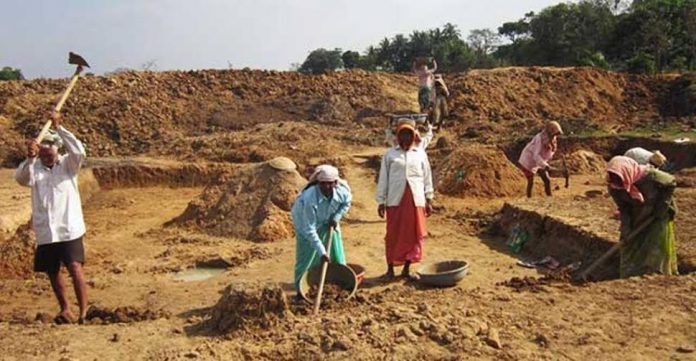TCN News
Civil society working with NREGA workers ‘NREGA Sangharsh Morcha’ have issued a press statement stating that many of the workers under MNGREGA scheme have not been paid since past several months.
The statement said, “Wage payments for the Mahatma Gandhi National Rural Employment Guarantee Act (MGNREGA) are frozen in nineteen states in the country. Since August 31 this year, no wage payments have been made in Haryana, since the first week of September, no wage payments have been made in Karnataka and West Bengal, and since a month no wage payments have been made in Kerala and Jharkhand, among other states.”
According to the study conducted by the Morcha workers, Wage payments worth at least Rs. 3,066 crores are pending due to lapses by the central and state governments and insufficiency of funds allotted for the programme; a problem that recurs year after year and is unlikely to get resolved soon. These are wage payments for which the Fund Transfer Orders (FTOs) have been approved by the first and second signatories; these are pending at the level of the Union Government.

[Source: R8.10.1 Status of FTO Transaction Processed Through PFMS Window after NEFMS Implementation, www.nrega.nic.in, as of October 20, 2017]
Morcha claimed that the delays in wage payments of lakhs of workers caused due to the failure of the central government, banks and post offices in discharging their responsibilities is not recorded or reflected anywhere. This makes the “payment on time figure” used by the Ministry meaningless, and a mockery to citizens who have a legal right to work.
Moreover, there is no legal compensation being calculated and paid for these delays. The Supreme Court on May 13, 2016 had ordered the payment of all compensation due, and had commented “We can understand delayed payment of a few days or weeks to a few people, but in this case it is delayed payment of a few weeks (if not more) to lakhs of people. Given the enormous number of persons involved, this is really unfortunate.”
Even so, in brazen violation of court orders, and complete disregard for worker rights, only Rs. 3.6 crore of the payable Rs. 34.7 crore as compensation has been paid for this financial year. Calculations by independent researchers released in August 2017, shows that the true payable penalty by the government to the workers for payment delays for just one financial year, 2016-17, was around Rs 1200 crores.
Last month, about a thousand workers and their supporters from thirteen states protested in Delhi demanding timely wage payments, among other things.
The statement said, “Clearly, this fell on deaf years. As the Supreme Court commented – ‘It is quite clear therefore, that when the rights of tens of thousands of people are affected by delayed payment of their legitimate dues, there is a clear constitutional breach committed by the State – be it the Government of India or a State Government. We have not been given any explanation whatsoever why a person would want to work without wages or at least work with an uncertainty in timely receipt of wages. It just does not stand to reason.’”
The Sangharsh Morcha claimed that this is not the first time this has arisen; almost no FTO was processed for about 20 days in March – April 2017, and there was close to 80% pendency in May 2017. At present, nine states have a negative balance, and the central government has already exhausted 87% of funds available. The demand for work will pick up now, post the monsoons. The Supreme Court as part of a Public Interest Litigation will hear this matter on 5th December 2017.
Citing the shortcomings of the scheme and delayed payments of the workers, NREGA Sangharsh Morcha has demanded immediate allocation of additional funds by the central government to meet the full demand for work; immediate clearance of all the FTOs(fund transfer orders); calculation of the full extent of the delay in wage payment i.e. till the crediting of wages in workers accounts; and calculation and automatic payment of the full extent of compensation for delayed payments (no official or functionary should have the discretion of rejecting the payable compensation amount, as is currently the case).

